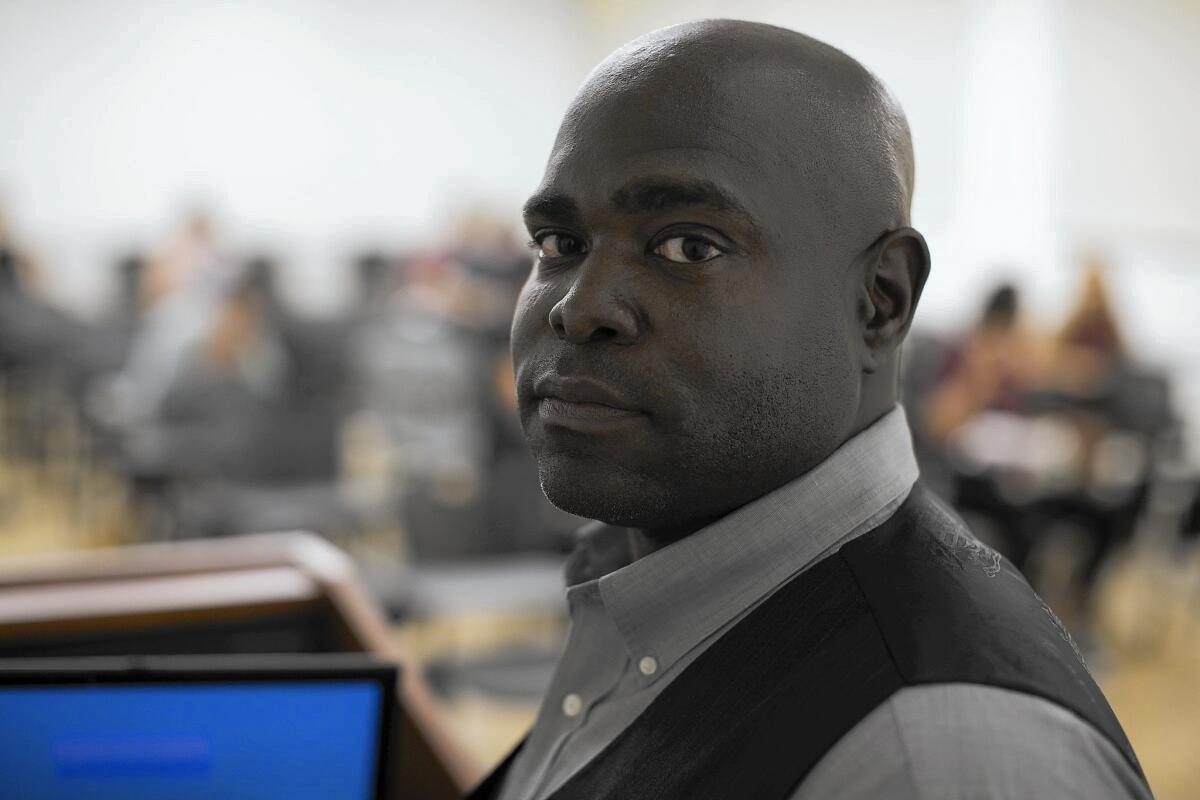Two decades later, L.A.-area participants recall the Million Man March in D.C.

- Share via
In 1995, a rallying cry went out to African American men in all corners of the nation, urging them to come together for a Million Man March in Washington.
John Hamilton answered the call.
For the 24-year-old Watts schoolteacher, the march’s message of atonement and reconciliation among African Americans hit home. He wanted to be a “better man … a walking example” for his fifth-graders at 112th Street Elementary School.
As the march celebrates its 20th anniversary this week, Hamilton reflected on how it felt to stand on the National Mall, shoulder-to-shoulder with a sea of black faces.
“It was powerful,” Hamilton, now 44, said between mentoring college students of color. “The march was really a catalyst for me to start thinking about what I was doing for myself and my community.”
Two decades later, the crowd count for the Million Man March remains in dispute, with some estimating that the event’s name matched the numbers that showed up and others saying it drew less than half of 1 million people. Still, the march became a watershed moment in black history.
“There were very clear action steps out of that march that frankly are still coming to fruition to this day,” said Los Angeles City Councilman Marqueece Harris-Dawson, who attended the event. The drop in teen pregnancy, violent crime and homicides, he said, is “partly related to the strategies people pursued after coming back from that event.”
Hamilton said he returned to L.A. from the nation’s capital with a deeper sense of power and purpose.
After the march, he earned his master’s and doctoral degrees in education and started a business, Hamilton and Associates Consulting, which creates curriculum for young black men. More recently, he became the interim director of the Educational Opportunity Program at Cal State Long Beach.
In the immediate months and first year after the Million Man March, black leaders and social service organizations reported a surge in civic engagement and community activism.
Black men signed up in droves to become Big Brothers. People sought out the local chapters of the National Assn. for the Advancement of Colored People and the Urban League, looking for ways to volunteer. More than 300 families signed up to adopt children, Nation of Islam Minister Tony Muhammad told The Times a month after the march, and volunteers registered more than 3,000 new voters.
Hamilton said even his school’s neighborhood benefited from the post-march energy.
The Pop Warner football team he coached doubled its fundraising, which allowed it to add a second team. More men came out to mentor and help with training.
But over time, the enthusiasm that followed the Million Man March slowly dissipated.
“There’s power in numbers,” said Kevin Kent, 46, of Cerritos. “Once we left that setting and were back in our corners of the world, we didn’t have that same type of support. It’s tough to keep that going.”
In the years since the march, the black community has experienced progress and setbacks. In 2008 the United States elected it first black president, Barack Obama, and there are more African Americans in top governmental and business positions.
But recent high-profile allegations of excessive use of force by police, in places such as Ferguson, Mo., New York, Cleveland and L.A., have also renewed feelings among many black men that they remain targets for discrimination.
That’s was the inspiration behind last week’s Justice or Else march in Washington to commemorate the Million Man March. Both events were organized by Nation of Islam leader Louis Farrakhan.
“It’s odd to see 20 years later that we are not in a better position,” said Carlos McCullers, 45, of Northridge, who participated in the 1995 march.
Danny Bakewell Sr., a real estate developer and former co-chair of the march’s L.A. headquarters, recalled feeling the “electricity” that emanated from the crowd 20 years ago as he stood at the lectern and peered at the black faces that stretched from the Capitol to the Washington Monument. Bakewell, 70, marveled at how everybody seemed to “unify around our sameness and strength.”
He created the Taste of Soul family festival, which draws hundreds of thousands of African Americans to the Crenshaw district. On Saturday, the festival celebrated its 10th anniversary.
“Million Man March is a living organism that will forever live on,” he said.
Kent agreed.
“What that experience put in us, it’ll never go away,” he said. “Though it might not be as strong as it was in October of ’95.”
Twitter: @AngelJennings
ALSO:
Lamar Odom improves: He is talking, texting, ‘doing good’
Judge: Texas can deny birth certificates for U.S.-born children of some immigrants
Study sends ‘wake-up call’ about black and Latino arts groups’ meager funding
More to Read
Sign up for Essential California
The most important California stories and recommendations in your inbox every morning.
You may occasionally receive promotional content from the Los Angeles Times.














